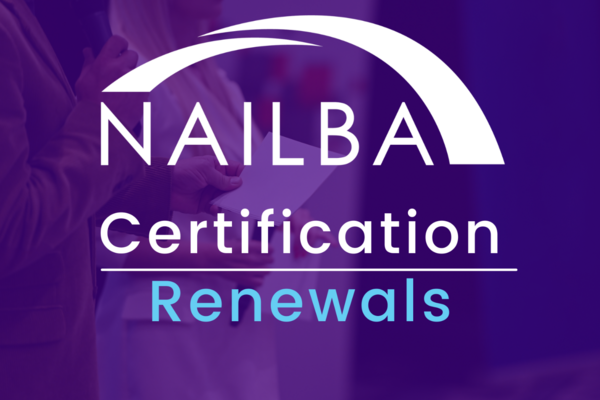Upcoming Sessions
- There are no upcoming sessions scheduled
See All Upcoming Sessions

The NAILBA Case Manager Certification Program helps train and develop new case managers on the life insurance case management process, while certifying existing case managers on the key skills, responsibilities, and best practices that are essential for their role. The program, which has been designed with a life insurance focus, is comprised of eight online learning modules with mastery quizzes for each module. FIELD DEVELOPMENT COMMITTEE Abby Milner Mann – Vice President, New Business The Milner Group Leah Mahoney, FLMI, PCS – Director of Operations Diversified Brokerage Services, Inc. Carolyn Sampson – Sr. Vice President of New Business The National Benefit Corp Kany MacLellan – AVP, Underwriting and New Business Brokers’ Service Marketing Group Haley Chaires – Life Relationship Manager Ash Brokerage Helena Roberts – Vice President Life Solutions, Underwriting, and New Business Lincoln Financial Group Heather Dowd – Sr. Training Consultant Life Solutions, Underwriting & New Business Lincoln Financial Group Amanda Singer, FLMI, ACS – Vice President Crump Life Insurance Services Tiffany Markarian – Managing Director and Founder Advantus Marketing, LLC Peri Lane – Owner Apis Productions CONTRIBUTING SUBJECT MATTER EXPERTS Andrea Caruso – Executive Vice President and Chief Operating Officer MIB Group, Inc. Melinda Meyer – President Aspen Strategies, LLC Joangel Concepcion – Director, Memebership and Digital Engagement NAILBA Jane Riley – Chief Compliance Officer The Leaders Group, Inc. Alaina Winson – Support and Services Manager / Operations Project Manager Diversified Brokerage Services, Inc. Dawn Goss – Licensing and New Account Specialist Diversified Brokerage Services, Inc. Lori-Anne Walker – Chief Underwriter Diversified Brokerage Services, Inc. Jann Varner, FLMI – Case Design Team Manager Diversified Brokerage Services, Inc. Brandon Johnsen – Senior Case Design Analyst Diversified Brokerage Services, Inc. Shannon Daly – Product Analyst, Individual Life Lincoln Financial Group Read more

As payment expectations accelerate across every industry, insurance remains one of the few where commission payouts still take 30–45 days. That delay is no longer just an operational inconvenience, it’s becoming a competitive liability. This webinar will explore how payment speed directly impacts producer retention, recruiting, and growth, and why leading agencies are modernizing their commission infrastructure to keep pace. We’ll examine the operational constraints that slow payouts today and how faster, more reliable payments can unlock measurable revenue impact. We’ll explore: Why payment speed is emerging as a key differentiator in producer retention and recruiting The hidden operational and financial costs of delayed commission payouts How leading agencies enable faster payouts without sacrificing accuracy or control What foundational systems are required to support scalable, accelerated payments Read more
.png)
Medicare is often seen as a niche line of business for health-focused agencies, but the reality is that it’s quietly influencing producer loyalty, client retention, and agency relevance across the life and annuity space. This session is designed for NAILBA member BGAs and their operations leaders who want to: Understand how Medicare Advantage and Medicare Supplement trends are shaping the broader insurance distribution ecosystem. Evaluate the operational and competitive risks of not having a Medicare strategy even if you never plan to sell it directly. Identify process and tracking approaches that protect revenue when working across multiple carriers and commission structures. We’ll explore: The latest enrollment data and growth patterns in Medicare Advantage and Medigap—and what they signal for producer behavior. How competitors outside the life space use Medicare as a “relationship entry point” with clients. Where commission management challenges emerge in a multi-product, multi-carrier environment, and strategies to address them. You’ll leave with an understanding of the Medicare landscape and a framework for evaluating whether and how it should factor into your BGA’s retention and revenue strategies. Read more

The Commissions Module equips participants with a practical understanding of how compensation flows across carriers, BGAs, and advisors, and why it is central to advisor retention and firm health. The course covers first-year, renewal, and trail commissions, as well as product-specific differences across life, annuities, hybrids, long-term care, and Medicare products. Learners will explore inforce transactions that impact pay, regulatory considerations in states like New York, and how to resolve commission errors quickly to maintain trust. The module also introduces the role of technology and reporting systems in reconciling payments, managing hierarchies, and ensuring compliance. By the end, participants will be able to interpret statements, anticipate commission impacts, and support accurate, timely compensation across diverse product lines. Lesson Overview: Medicare Supplements & Medicare Advantage This lesson introduces commissions for Medicare Supplement and Medicare Advantage products. Learners will explore how commissions differ from traditional models, with flat fees set by CMS or percent-of-premium arrangements. The lesson also highlights challenges with tracking, renewals, and licensing requirements unique to Medicare products. Learning Objectives Differentiate between Medicare Supplement and Medicare Advantage commissions. Explain how flat fees vs. percent-of-premium models impact advisor pay. Recognize the timing and reconciliation challenges of Medicare commissions. Understand regulatory and licensing requirements for Medicare sales. COURSE CONTRIBUTORS Leah Mahoney – EVP - Operations Diversified Brokerage Services, Inc. Kayla Doherty – Customer Operations Analyst Securian Jon Duvall – Director, Commissions and PlanAdmin Ash Brokerage Lionel Gusti – IT, Commissions Manager Innovative Solutions Insurance Services, LLC Jason Kidd – Senior Vice President Innovative Solutions Insurance Services, LLC Katie Spinner – Director of Commission Operations Ash Brokerage Jim Tigrak – Commission Analyst Simplicity Los Angeles Jessica Schultz – Licensing & Commission Supervisor Diversified Brokerage Services, Inc. Allie Munson – Commission Specialist Diversified Brokerage Services, Inc. Read more

The Commissions Module equips participants with a practical understanding of how compensation flows across carriers, BGAs, and advisors, and why it is central to advisor retention and firm health. The course covers first-year, renewal, and trail commissions, as well as product-specific differences across life, annuities, hybrids, long-term care, and Medicare products. Learners will explore inforce transactions that impact pay, regulatory considerations in states like New York, and how to resolve commission errors quickly to maintain trust. The module also introduces the role of technology and reporting systems in reconciling payments, managing hierarchies, and ensuring compliance. By the end, participants will be able to interpret statements, anticipate commission impacts, and support accurate, timely compensation across diverse product lines. Lesson Overview: Resolving Commission Errors This lesson focuses on identifying and resolving commission errors that can disrupt advisor trust and delay payments. It highlights best practices like maintaining reference toolkits, using checklists, and escalating to carriers when needed. Learners will also see how technology and root cause analysis can prevent repeat errors. Learning Objectives Identify common commission errors and their impact on advisors. Use checklists and standardized processes to resolve errors quickly. Leverage technology and escalation paths for error resolution. Explain the importance of audits and root cause analysis in error prevention. COURSE CONTRIBUTORS Leah Mahoney – EVP - Operations Diversified Brokerage Services, Inc. Kayla Doherty – Customer Operations Analyst Securian Jon Duvall – Director, Commissions and PlanAdmin Ash Brokerage Lionel Gusti – IT, Commissions Manager Innovative Solutions Insurance Services, LLC Jason Kidd – Senior Vice President Innovative Solutions Insurance Services, LLC Katie Spinner – Director of Commission Operations Ash Brokerage Jim Tigrak – Commission Analyst Simplicity Los Angeles Jessica Schultz – Licensing & Commission Supervisor Diversified Brokerage Services, Inc. Allie Munson – Commission Specialist Diversified Brokerage Services, Inc. Read more

The Commissions Module equips participants with a practical understanding of how compensation flows across carriers, BGAs, and advisors, and why it is central to advisor retention and firm health. The course covers first-year, renewal, and trail commissions, as well as product-specific differences across life, annuities, hybrids, long-term care, and Medicare products. Learners will explore inforce transactions that impact pay, regulatory considerations in states like New York, and how to resolve commission errors quickly to maintain trust. The module also introduces the role of technology and reporting systems in reconciling payments, managing hierarchies, and ensuring compliance. By the end, participants will be able to interpret statements, anticipate commission impacts, and support accurate, timely compensation across diverse product lines. Lesson Overview: New York Regulations This lesson explains New York’s unique commission regulations, including limits set by Section 4228 and related rules. Learners will explore how expense allowances, split commissions, and licensing requirements affect compensation. The lesson emphasizes compliance, accurate coding, and proper forecasting when processing New York cases. Learning Objectives Recognize how New York’s Section 4228 caps affect first-year commissions. Explain how expense allowances work alongside advisor compensation. Identify the importance of proper coding on NY commission statements. Understand licensing and disclosure requirements unique to New York business. COURSE CONTRIBUTORS Leah Mahoney – EVP - Operations Diversified Brokerage Services, Inc. Kayla Doherty – Customer Operations Analyst Securian Jon Duvall – Director, Commissions and PlanAdmin Ash Brokerage Lionel Gusti – IT, Commissions Manager Innovative Solutions Insurance Services, LLC Jason Kidd – Senior Vice President Innovative Solutions Insurance Services, LLC Katie Spinner – Director of Commission Operations Ash Brokerage Jim Tigrak – Commission Analyst Simplicity Los Angeles Jessica Schultz – Licensing & Commission Supervisor Diversified Brokerage Services, Inc. Allie Munson – Commission Specialist Diversified Brokerage Services, Inc. Read more
Shopping Cart
Your cart is empty
